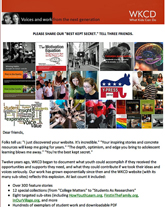OTHER WKCD WEBSITES SPECIAL COLLECTIONS Students as Allies in School POPULAR WKCD PUBLICATIONS (PDFS] A Guide to Creating Teen- Cultural Conversations through Creative Writing Documenting Immigration Stories First Ask, Then Listen: How Your Students Can Help You Teach Them Better Making Writing Essential to Profiles of Politically Active Youth Queer Youth Advice for Educators The Schools We Need: Creating Small High Schools That Work for Us
| WKCD Youth Action Research Grants Update from WKCD| MAY 14, 2015
PROVIDENCE, RI —For the past five months, winning teams in our student action research program have been hard at work turning their plans into action. Most anticipate finishing their projects this summer or early fall. While we wait for the final results, we thought we'd share a few early "products." They're the tip of the iceberg, we know. Root Knowledge, Spring 2015, Edition 2 (PDF) One of the winners of a WKCD Youth Action Research Grant was a group of public high school students in Chicago who have helped start a student-led journal (Root Knowledge) with well-researched content on socio-economic issues ranging from environmentalism to immigration. Published six times a year, the Root Knowledge Journal gives students a voice in how critical social issues rarely discussed in school might be embedded in the school curriuculum. In the preface to this new edition, the student editors write:
East Chicago, Indiana Youth Survey (PDF) In East Chicago, Indiana and hundreds of declining cities like it, leaders from businesses, churches, and schools struggle to understand and fix the problems afflicting their neighborhoods. Rarely do they engage the one group with the most hope and the greatest ability to adapt: young people. The Greenhouse Fellowship, started by recent East Chicago high school graduates, is in the process of surveying over 2,000 city youth about the opportunities they need most. The youth created their survey after months of research and pilot interviews. 13 News Now Investigates: Community Teams Up to Fight the Spread of Hydrilla (Video) Stopping the spread of the aquatic plant Hydrilla in the Chowan River has become a passion for science teacher Steve Karl and his students at John Holmes High School, Edenton, NC. The invasive species threatens local commercial fishermen, fisheries, boaters, and swimmers. For the past year, the Edenton high school students have been studying and raising awareness about hydrilla throughout their community. They have also created an axle rake to scrape Hydrilla off the axels of boat trailers. Their campaign recently attracted the attention of local media.
What Kids Can Do, Inc. | info@whatkidscando.org | www.whatkidscando.org
|



